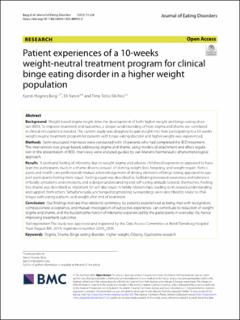| dc.description.abstract | Background
Weight based stigma might drive the development of both higher weight and binge eating disorder (BED). To improve treatment and outcomes, a deeper understanding of how stigma and shame are correlated in clinical encounters is needed. The current study was designed to gain insight into how participating in a 10-weeks weight-neutral treatment program for patients with binge eating disorder and higher weight was experienced.
Methods
Semi-structured interviews were conducted with 10 patients who had completed the BED treatment. The intervention was group based, addressing stigma and shame, using models of attachment and affect regulation in the presentation of BED. Interviews were analyzed guided by van Manen’s hermeneutic-phenomenological approach.
Results
A profound feeling of inferiority due to weight stigma and adverse childhood experiences appeared to have kept the participants stuck in a shame driven carousel of dieting, weight loss, bingeing, and weight regain. Participants and health care professionals’ mutual acknowledgement of driving elements of binge eating appeared to support participants feeling more equal. Feeling equal was described as facilitating increased awareness and tolerance of bodily sensations and emotions, and a deeper understanding and self-caring attitude towards themselves. Feeling less shame was described as important for self-disclosure in family relationships, leading to increased understanding and support from others. Simultaneously, unchanged stigmatizing surroundings were described to relate to challenges with eating patterns and weight after end of treatment.
Conclusion
Our findings indicate that relational symmetry, by patients experienced as being met with recognition, compassionate acceptance, and mutual investigation of subjective experience, can contribute to reduction of weight stigma and shame, and the burdensome notion of inferiority experienced by the participants in everyday life, hence improving treatment outcomes.
Trail registration The study was approved and registered by the Data Access Committee at Nord-Trøndelag Hospital Trust August 8th, 2019, registration number 2019_2335. | en_US |

